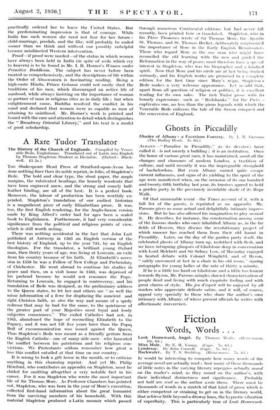Ghosts in Piccadilly
Shades of Albany : a Facetious Fantasy. By 1. NI. Parsons: (The Bodley Head. 3s. lid.) ALBANY—* Paradise in Piccadilly," as its devotees have called it—is not merely a building ; it is an institution. Once the home of various great men, it has maintained, amid all the changes and clamours of modern London, a tradition of culture, and until recently it was the impregnable st maghold of bachelordom. But even Albany cannot quite escape current influences, and signs of its yielding to the spirit of the age were manifested when, on the occasion of its one hundred and twenty-fifth birthday last year, its trustees agreed to hold a garden party in the previously inviolable shade of its Rope Walk.
Of that memorable event—the Times account of it, with a full list of the guests, is reprinted as an appendix Mr. Parsons gives us sonic actual and delightfully intimate impres- sions. But he has also allowed his imagination to play around it. He describes, for instance, the consternation among some of the famous shades who once inhabited Albany as, in the far fields of Heaven, they discuss the revolutionary junket of which rumour has reached them from their old haunt in Piccadilly.. Later, on the day of the garden party itself, the celebrated ghosts of Albany turn up, reclothed with flesh, and we have intriguing glimpses of Gladstone deep in conversation with Lord Melehett and Sir Sidney Low, of Macaulay engaged in heated debate with Colonel Wingfield, and of Byron, " safely ensconced at lust in a chair in his old room," signing autographs for young ladies at the rate of thirty a minute.
If he is a little too hard on Gladstone and a little too lenient towards Bynm, Mr. Parsons mingles shrewd characterisation of people dead and living with much exquisite fooling :Mil with great charm of style. His jar &esprit will be enjoyed by all readers who appreciate delicate satire, and it will, of course, appeal very specially to those who share the author's own intimacy with Albany, of whose present officials he writes with affectionate irreverence.
































 Previous page
Previous page